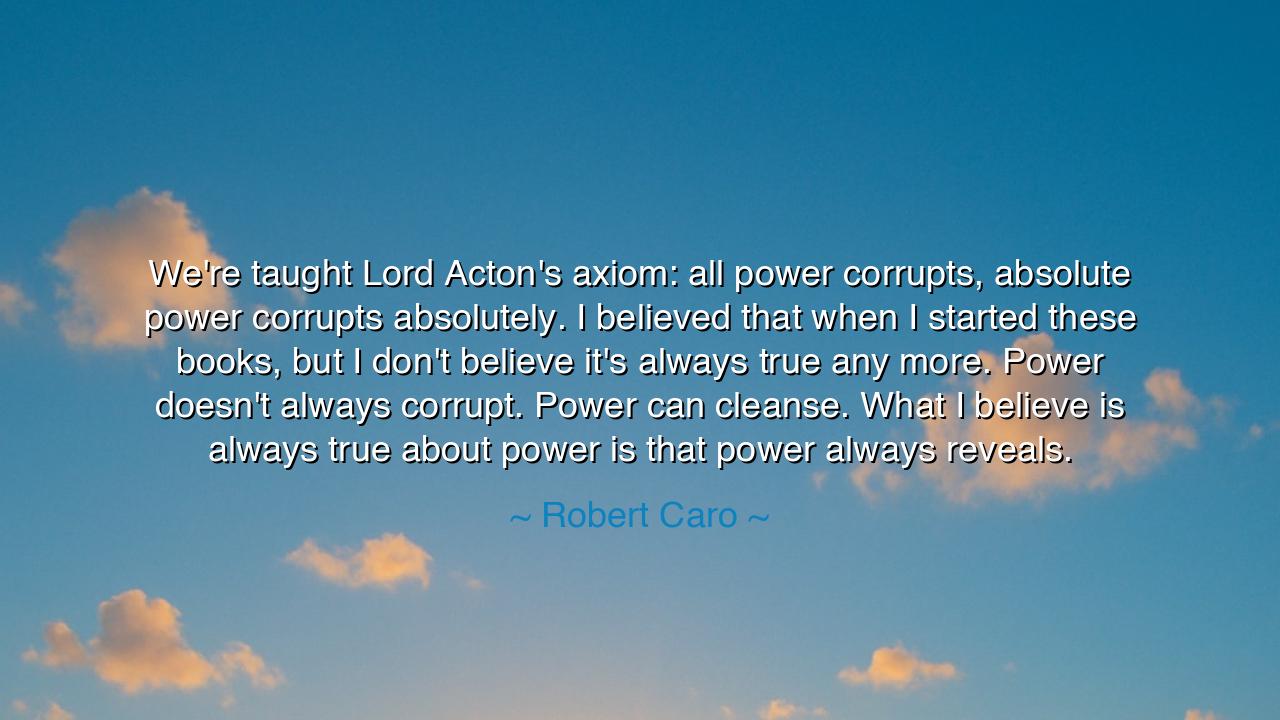
We're taught Lord Acton's axiom: all power corrupts, absolute
We're taught Lord Acton's axiom: all power corrupts, absolute power corrupts absolutely. I believed that when I started these books, but I don't believe it's always true any more. Power doesn't always corrupt. Power can cleanse. What I believe is always true about power is that power always reveals.






“We're taught Lord Acton's axiom: all power corrupts, absolute power corrupts absolutely. I believed that when I started these books, but I don't believe it's always true anymore. Power doesn't always corrupt. Power can cleanse. What I believe is always true about power is that power always reveals.” These words from Robert Caro challenge the long-held belief that power inevitably corrupts those who wield it. While Lord Acton’s famous axiom warned that absolute power leads to moral decay, Caro offers a different perspective: power does not always corrupt, but it does always reveal. Power is a lens through which the true nature of individuals and institutions is exposed — it is not the power itself, but the way it is used that shows who we truly are.
In the ancient world, Plato also grappled with the nature of power in his work The Republic. He believed that the wise ruler would govern not for personal gain but for the good of the state, recognizing that power could be used for justice if wielded by a virtuous individual. In contrast to Lord Acton’s view, Plato suggested that power does not inherently corrupt; rather, it is the character of the individual that determines whether power is used for good or ill. Caro’s words echo this ancient truth: power reveals the heart of the ruler. A corrupt ruler exposes his flaws through the abuse of power, while a just ruler reveals his integrity by using power for the common good.
Consider the story of George Washington, a man who stood at the pinnacle of power yet remained steadfast in his virtue. As the first president of the United States, Washington had the opportunity to seize more power than most men ever could. Yet, he willingly stepped down after two terms, a decision that revealed his character. In Washington’s case, power did not corrupt; instead, it revealed his commitment to the principles of democracy and self-governance. His restraint in relinquishing power was an act of moral clarity that set a precedent for future leaders. In this way, power served as a revealing force, showing Washington’s true nature as a servant of the people, rather than a tyrant.
Similarly, Abraham Lincoln, in his leadership during the American Civil War, demonstrated how power can reveal the noblest of qualities. Amid the nation's darkest days, Lincoln’s decision to preserve the Union and abolish slavery exposed his moral fortitude and unwavering commitment to justice. In Lincoln’s case, power did not corrupt him, but rather revealed his deep sense of responsibility and compassion for the oppressed. His actions during the war demonstrated that power can be a force for good, one that cleanses the sins of a nation by confronting its darkest injustices.
However, Caro’s insight also serves as a reminder that power can indeed reveal darker qualities. Take, for instance, the rise of Joseph Stalin in Soviet Russia. Stalin’s absolute power over the Soviet Union revealed his ruthlessness and propensity for violence. As he consolidated power, his actions — the purges, the forced labor camps, the suppression of dissent — exposed his insatiable hunger for control and his willingness to sacrifice millions of lives for his vision of a communist state. In Stalin's case, power did not cleanse, it revealed the depths of his corruption and tyranny.
Thus, Caro’s view of power invites us to see it as a force that exposes, not merely corrupts. It is through the exercise of power that we come to know the true character of those who wield it, and by power’s light, both the noble and the nefarious are laid bare. Whether it reveals the wisdom of Washington or the darkness of Stalin, power has an inherent ability to reflect the inner nature of its possessor.
In conclusion, Caro’s insight calls us to reconsider the nature of power and its relationship to corruption. While Lord Acton’s axiom warns us of the dangers of absolute power, Caro reminds us that power is a mirror, revealing not only the flaws but also the virtues of those who hold it. It is not the power itself that is inherently corrupting, but how it is used that shapes its impact — revealing the character of leaders in ways that cannot be hidden.






AAdministratorAdministrator
Welcome, honored guests. Please leave a comment, we will respond soon